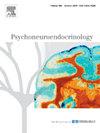急性免疫系统激活对抑制控制产生时间依赖性影响:流感疫苗接种随机对照实验以及系统回顾和荟萃分析的结果 - ISPNE 2024 Dirk Hellhammer 奖。
IF 3.4
2区 医学
Q2 ENDOCRINOLOGY & METABOLISM
引用次数: 0
摘要
虽然生病或接种疫苗都是常见的经历,但这种急性免疫系统激活对认知过程(如抑制控制)的影响却很少受到关注。为了解决这个问题,我们在随机对照实验中评估了急性免疫系统激活对抑制控制的影响,并对人类的类似研究进行了荟萃分析。在实验中,我们意外地发现,接种流感疫苗提高了抑制控制能力的两项结果(即停止信号反应时间和侧翼干扰效应)。在荟萃分析层面,我们发现在免疫激活和抑制控制评估之间的短时间延迟(注射后 1.5-4 小时)内,免疫激活会损害多种形式的抑制控制,而在较长时间延迟后(如注射后 18 小时以上),免疫激活会改善抑制控制--这与我们的实验一致。此外,即使在注射和测试之间有较长的延迟时间,促炎细胞因子的活性也能预测较差的干扰控制,但却能预测较好的反应抑制。总之,这些结果凸显了急性免疫系统活动对抑制控制的细微、时间依赖性和多种机制驱动的影响。本文章由计算机程序翻译,如有差异,请以英文原文为准。
Acute immune system activation exerts time-dependent effects on inhibitory control: Results of both a randomized controlled experiment of influenza vaccination and a systematic review and meta-analysis – ISPNE 2024 Dirk Hellhammer Award
Although coming down with an illness or receiving a vaccine are both common experiences, the influence of such acute immune system activations on cognitive processes, such as inhibitory control, has received relatively little attention. We addressed that issue by assessing the effects of acute immune system activation on inhibitory control in a randomized controlled experiment, and by conducting a meta-analysis of similar studies in humans. In our experiment, we found—somewhat surprisingly—that influenza vaccination improved performance on both of our inhibitory control outcomes (i.e., stop-signal reaction times and flanker interference effects). At the meta-analytic level, we found that at a short delay (1.5–4 hours post-injection) between immune activation and inhibitory control assessment, such activation impaired multiple forms of inhibitory control, whereas after a longer delay (e.g., > 18 hours post-injection), such activation improved inhibitory control—consistent with our experiment. Moreover, proinflammatory cytokine activity predicted poorer interference control but better response inhibition, even with a long delay between injection and testing. Together, these results highlight nuanced, time-dependent, and—perhaps—multiple-mechanism-driven effects of acute immune system activity on inhibitory control.
求助全文
通过发布文献求助,成功后即可免费获取论文全文。
去求助
来源期刊

Psychoneuroendocrinology
医学-精神病学
CiteScore
7.40
自引率
8.10%
发文量
268
审稿时长
66 days
期刊介绍:
Psychoneuroendocrinology publishes papers dealing with the interrelated disciplines of psychology, neurobiology, endocrinology, immunology, neurology, and psychiatry, with an emphasis on multidisciplinary studies aiming at integrating these disciplines in terms of either basic research or clinical implications. One of the main goals is to understand how a variety of psychobiological factors interact in the expression of the stress response as it relates to the development and/or maintenance of neuropsychiatric illnesses.
 求助内容:
求助内容: 应助结果提醒方式:
应助结果提醒方式:


